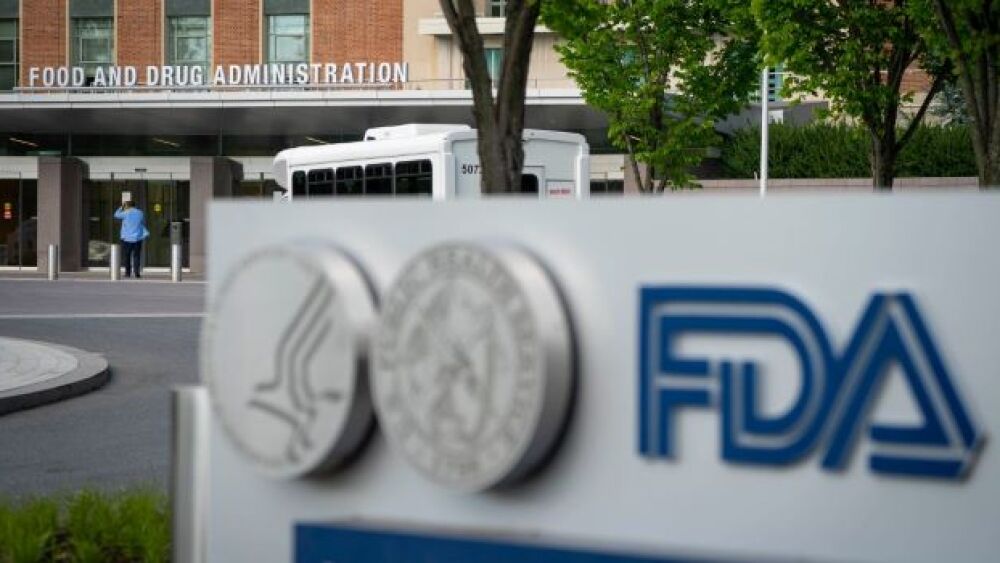As May gets off to a slow start for the FDA calendar, a few companies have important target action dates.
Sarah Silbiger/Getty Images
Early May is a relatively slow time for the U.S. Food and Drug Administration in terms of PDUFA dates. And even more so since one of the scheduled dates has been pushed back until September. Continue reading for more details.
Phathom’s Voanoprazan for H. Pylori Infections
Phathom Pharmaceuticals has a target action date of May 3, 2022, for two New Drug Applications (NDAs) regarding vonoprazan-based treatments for H. pylori infection. They are for two convenience packs of vonoprazan-based regimens in combination with amoxicillin and clarithromycin and for vonoprazan in combination with amoxicillin. Both were granted Priority Review. The FDA had previously designated vonoprazan dual and triple therapy as qualified infectious disease products (QIDPs), which if it is approved for these indications in these combinations will provide an extra five years of regulatory exclusivity.
The drug hit its primary endpoints and key secondary superiority endpoints in PHALCON-EE, a pivotal Phase III trial for erosive esophagitis. Phathom submitted an NDA for that indication on March 14.
Vonoprazan is an oral small molecule potassium-competitive acid blocker (P-CAB), which blocks acid secretion in the stomach.
Myovant and Pfizer’s Myfembree for Endometriosis
Myovant Sciences and Pfizer have a target action date of May 6 for their supplemental NDA (sNDA) for Myfembree (relugolix 40 mg, estradiol 1 mg, and norethindrone acetate 0.4 mg) for the management of moderate to severe pain associated with endometriosis. The submission was supported by data from the Phase III SPIRIT program, which included two duplicate trials, SPIRIT 1 and 2.
The drug is indicated in the U.S. for the management of heavy menstrual bleeding associated with uterine fibroids in premenopausal women, with a treatment duration of 24 months. It was approved for that indication on May 26, 2021.
On April 12, the companies announced that they’d been informed by the FDA that it had identified deficiencies that at that time precluded discussion of labeling and/or post-marketing requirements and commitments. There were no additional details and this did not reflect a final decision on the sNDA.
Bluebird Bio’s Gene Therapy for Beta-Thalassemia
Bluebird bio had a target action date of May 20 for its Biologics License Application (BLA) for betibeglogene autotemcel (beti-cel), a gene therapy intended for adult, adolescent and pediatric patients with beta-thalassemia across all genotypes who require regular red blood cell (RBC) transfusions. If approved, it will be the first one-time treatment for the underlying genetic causes of disease for beta-thalassemia in the U.S. Otherwise, treatment is regular RBC transfusions and iron chelation therapy.
The BLA is based on data from its HB-207 and HBT-212 Phase III trials, the Phase I/II HGB-204 and HGB-205 studies, as well as a long-term follow-up study, LTF-303.
On January 18, bluebird announced that the FDA had extended the review period for the BLA until September 16, 2022. In addition, the company’s BLA for elivaldogene autotemcel (eli-cel) for cerebral adrenoleukodystrophy (CALD) has been extended to August 19, 2022.
The agency reportedly requested additional materials and required extra time to review them.
“Gene therapies are complex, potentially transformative treatment options for those living with severe genetic disease, and we all share a responsibility to be diligent for patients as we progress this novel field,” said Andrew Obenshain, chief executive officer of bluebird, at the time. “We look forward to continuing to work with the FDA on its ongoing reviews of beti-cel and eli-cel, and to bringing these therapies to patients with beta-thalassemia and cerebral adrenoleukodystrophy in the U.S. later this year.”





